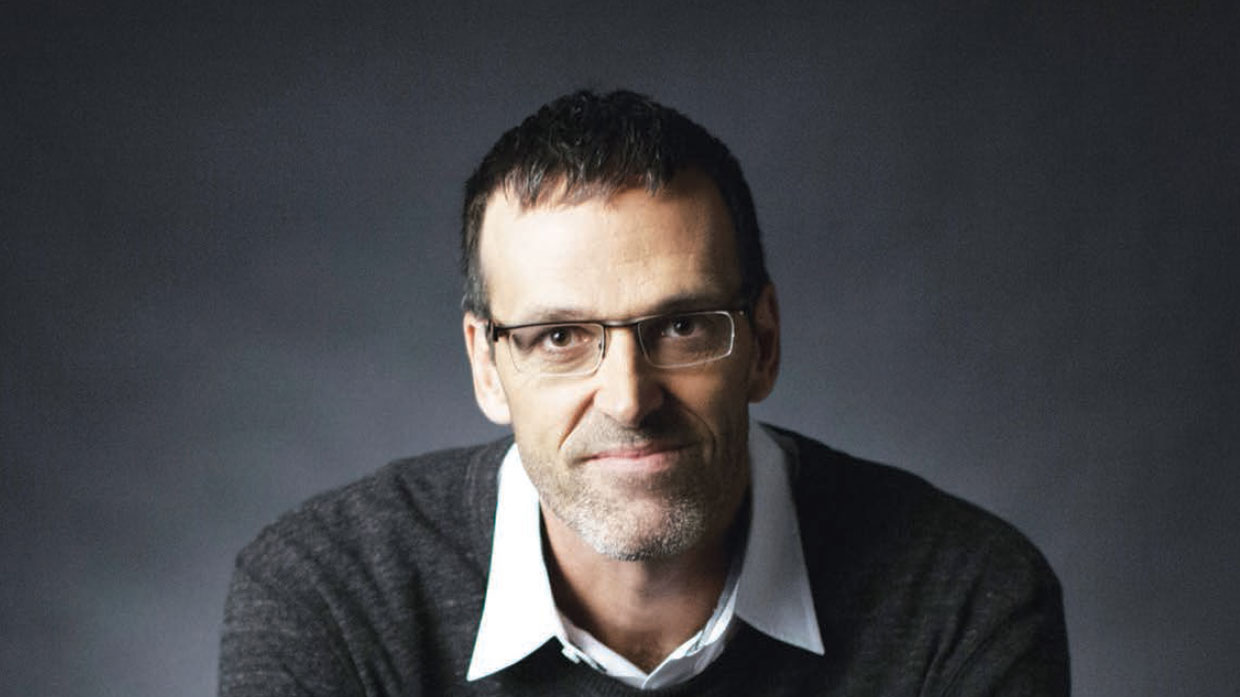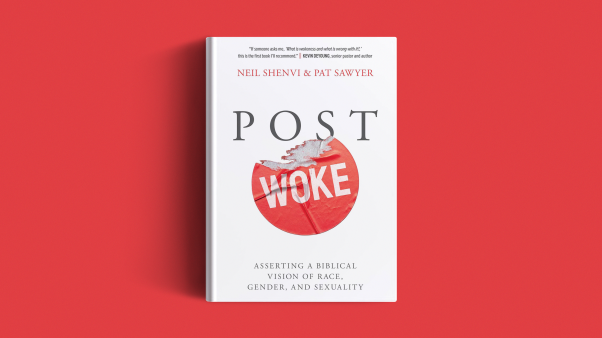If everything really is "bigger in Texas," Bent Tree Church in Dallas is no exception. Thousands attend multiple services at the sprawling campus every weekend. Even senior pastor, Pete Briscoe, is scaled to size, standing 6' 5" with huge hands and a broad, disarming smile. But traditional ministry metrics like size are the furthest thing from Briscoe's mind these days. Several years ago, a period of conflict in the church caused Briscoe to take a hard look at his own life. Ever since, he's led with a new focus and renewed freedom. Briscoe, the son of ministry leaders, Stuart and Jill Briscoe, has pastored Bent Tree for 22 years. Leadership Journal's managing editor, Drew Dyck, sat down with Briscoe to talk about what it takes to get and stay healthy in ministry.
What do you do to stay spiritually and emotionally healthy?
I've been on a wonderful spiritual journey in the last five years. It wasn't a journey from law to grace. But I've moved from a hybrid of law and grace to grace. I've always had a taste of grace, but over the last few years I've decided to bathe in it. And that has been, as far as my emotional and spiritual life, revolutionary.
In the past, I assumed my spiritual health was determined by how consistent I was in my quiet time, or how many books I'd read, or how long I prayed every day. I have been freed from all that. Now I recognize that my spiritual health is about how intimately I'm walking with Jesus.
It impacts every area of my life. Now I look at how open I am with people I love. When I am in the Word, what's really happening? Am I just reading a chapter to check it off or am I really listening to God? When I'm praying, am I honestly having a conversation with an Intimate, or am I just going through a list?
We talk a lot about how Christian faith is a relationship, not a religion. But I think for a lot of us it really is a religion, even in the evangelical world. It's about my quiet time, my worship, my service, my giving. It's this list. And the way we measure health is to ask, How am I doing in these areas?
What precipitated this shift?
We were having unity struggles in our senior leadership. I was partially to blame; others were partially to blame. It was a mess. And it was right when we were moving into this large, new building. When you go through major transition like that, it tends to surface these sorts of issues.
It was a difficult season for me. I received some very specific and challenging criticism from the board, and so I had some soul searching to do.
My eating habits were terrible. I never exercised. I sat behind a desk for 20 years and just atrophied.
My wife and I had also drifted apart. One night my wife, Libby, looked at me and said, "I'm just so angry at you, and I have no idea why." I was feeling the same. We admitted that we didn't even like each other anymore. We still loved each other, but we didn't want to be around each other.
All the important areas of my life were crashing on me. If you'd observed me from the outside, you wouldn't have known. I've got British blood in me, so I'm pretty good at keeping a stiff upper lip.
God showed me I'd had multiple identities over the years, but I had never seen myself primarily as God's son. Growing up, I was Stuart and Jill Briscoe's son. Then I was pastor of Bent Tree. That was my identity. Part of the reason the struggles in the church were so hard on me was because I couldn't separate myself from this church.
The thought of losing the church felt like losing life itself. But God was removing the things I'd taken pride in. And that made me vulnerable enough to turn my attention to what he wanted to show me: that I was his child, first and foremost.
The only way to survive in ministry is to know that's true. And that nothing can change that. You need to hear God say, "I don't care how big the church is. I don't care if you're meeting budget. I don't care if your last sermon was better than the one before. I don't care if you're on the radio. I don't care if anyone knows your name. You're my kid." That's what matters.
Once I got that, I started to lead like I had nothing to lose. If I lose the church, I'm still his kid. I started to love my wife in fresh ways, and God rebuilt our marriage beautifully. It was all based on this identity lesson.
Did you tell your congregation about this?
Yes, I preached a sermon that I think was probably surprising to a lot of people, because they didn't know I was struggling so much.
I did about a year-and-a-half series on Galatians. The way I had sought God's approval was by performing well—as a person, as a pastor, as a preacher. Reading Galatians I realized that it was that kind of thing that Paul was so pissed off about. And that's a fair word, because he uses stronger language in the first chapter of Galatians to describe how mad he is.
My wife looked at me and said, "I'm just so angry at you, and I have no idea why."
He's not angry because the Galatians were falling into legalism. The reason he was angry is because they were being taught Jesus plus law. As if Jesus is great to get you started, but then it's up to your performance to go from there.
Paul was saying, "No, it is just Jesus." There's nothing you can do to make him love you more, nothing to make him love you less. He loves you so much he gave his life for you when you were not performing well. That's the gospel. He loves you perfectly.
But we say, "Ok, you're saved, that's great. Now do this, this, this, and this. We'll tell you how much to give. We'll tell you how often to have a quiet time." The message we send: This is how you keep God pleased with you. And that is exactly the theology that Paul was so mad about.
I took our church through Galatians. We called it "Dancing Lessons," because I made the distinction between marching and dancing. As a body we're a lot healthier now. We're still seeking purity and holiness and all that Jesus brings in the context of true community and grace.
What unique spiritual challenges do pastors face?
Pastoral ministry is hazardous to your health on a number of different fronts. Think about relational health. As human beings, we need friends to be healthy. And as Christians, we know that biblical community is incredibly important to spiritual health as well as emotional and relational health. But being a pastor makes it really hard to make friends.
Some pastors, having been burned, refuse to be friends with anyone inside their church.
I think that's sad. Not only is it unhealthy, it's unrealistic. You spend the vast majority of your time with these people.
But I understand why some pastors feel that way. I've been burned over the years, and it's hard. You think you're truly friends with someone and then one day they introduce you as their pastor. And you're like, Wait. Really? So I'm your pastor first and your friend second. What I really need is someone who sees me as their friend first. And that is practically impossible to find. So many, many pastors are friendless, truly friendless.
How have you avoided this trap?
I have fallen into it in seasons, but by God's grace, I've been able to come out of it. I've found guys that do see me as friend first and pastor second. If I got fired tomorrow, they'd drive over to see if I was okay. They're true brothers, and we share life together. And that's beautiful.
How about friendships with other pastors?
Years ago I pulled a small group of pastors together. It was really fun. They're all leading great churches in Dallas. Our church was going to add a fourth service, and I wanted to know when to add it.
So I called one friend who had a Friday night service. I called another friend who had a Saturday night service, another friend who had a Sunday night service. And I said, "Tell us why you have the best model. We're all going to listen, and then we're going to have a discussion." We talked for four hours. At the end we said, "We've got to do this again!"
We've been meeting for 13 or 14 years now. Now it's a group of about 12 guys and we have lunch monthly. And those guys are dear friends, and because we minister in similar churches, there's a lot of camaraderie.
It's important to make the effort to find good friends. You need friends you can be honest with without being afraid of losing your job.
Do you work at maintaining your physical health?
I went a number of years without exercising. My health got really bad. The problem is I'm tall and slender, so I could hide it. I didn't put on 50 pounds and start to look overweight, but I was really unhealthy. My eating habits were terrible. I never exercised. I sat behind a desk for 20 years and just atrophied.
I went to the doctor and had blood work done. I was pre-diabetic and my cholesterol was through the roof. The doctor said, "We need some lifestyle changes. I don't see numbers like this in tall, slender guys like you." I was on a dangerous path.
He wanted to put me on a bunch of medications. I said, "Whoa, give me a chance. Let me make some changes." So I started to try to change my diet and exercise. The problem was my schedule didn't allow it. I didn't feel free during working hours to go work out because I didn't want to be seen as lazy.
This was before I'd undergone my experience of seeing myself first and foremost as God's son. I did not feel like it was okay for me to take care of my own health. I thought I had to take care of everyone else first. Most pastors think this way. Finally I went to my elders and said, "I need to figure out how to carve out time for exercise."
How did you carve out the time?
I figured out a number of years ago that the best way for me to see my family was to get home in time for dinner. The only way I could do that and lead the church was to start earlier and earlier in the morning. And so when I started to think about adding exercise four or five times a week, I realized, I can't get up any earlier.
And it wouldn't work to wake up in the middle of the night because if you're not sleeping, that hurts your health, too. But if I exercise after work, then I'd miss dinner with my family. So I went to the chairman of our board and I said, "I'm thinking of leaving the office at four every afternoon to go work out for an hour before dinner. I think long term this will be good for the church, because a healthy Pete is better for the church. I need to tell you, I feel guilty about this. And if you guys say no, I'll be fine with that."
Thankfully he immediately said, "We consider it part of your job to exercise."
So I started to hit the gym, but I needed a goal to work toward. I remember when I was in college there was a professor who had a goal of dunking on his 50th birthday. To work toward his goal, he would come and play with us on the basketball team. On his 50th birthday, he called the whole student body into the gym and went up and dunked it.
The whole place went totally crazy.
I'd always thought I wanted to do the same thing and dunk on my 50th birthday. But then I sat behind a desk for 20 years and didn't do anything. I couldn't have touched the net.
But when I started exercising, I thought, That's my goal. I've got three years to go.
I was close to a young man in the church who was a trainer. I cut a deal with him and said, "Hey, how about you train me, and I'll disciple you. We'll mentor each other at the gym and serve each other that way." He was totally into it. The first time we got together he said, "What's your goal?"
"I want to dunk on my 50th birthday," I said.
"Well, how high can you jump now?"
"Not even close."
But we worked really hard. When my 50th birthday rolled around, I went to the gym and got a dunk. We videoed it and put it on YouTube. It was really fun!
What would you say to pastors who want to get in shape but can't find the time?
Prioritize it. No one will look out for your calendar if you don't. No one will look out for your own health if you don't. That's your responsibility.
Take a risk and talk to your leaders. Ask them how they can help you prioritize your physical health. Tell them, "Here's what I can do, and here's what I can't. Here's what I can provide for you while loving my wife and raising my kids. If that's not okay with you, I probably won't last very long, and you're going to need to find someone else."
The vast majority of leadership teams will say, "We had no idea that you were struggling. How can we help you make boundaries?"
If you don't ask, ministry's going to eat you up. There's always too much to do. You always leave things undone. And it doesn't matter if your church is 12 people or 12,000, there's not enough time to do it all.
And so unless you paint boundaries, you will live an unhealthy life.
Starting is one thing, consistency is another. How do you stay at it?
With exercise, you have to be consistent. My wife has a great line. She says, "Consistency in exercise is starting over thousands of times." If you miss working out for three or four days, it's easy to get discouraged and just say, "I don't want to go back." But you just have to commit to starting over and over and over.
The late Dallas Theological Seminary professor Howard Hendricks was very heavy as a young man. His mentor at Dallas Seminary told him that he was robbing God.
When Hendricks said, "What are you talking about?" his mentor basically said, "The best years of your life, the years when you will have accumulated wisdom and experience and skill, you'll be in a grave instead of pouring into young people when they'll really need your wisdom."
It grabbed his attention and he made lifestyle changes immediately. He lost a ton of weight. And until he died at the age of 88, he was fit and trim. You would never have imagined he started out heavy and out of shape. But what his mentor told him was true.
The impact of the last 20 years of his life was unbelievable.
I strongly encourage pastors to get annual checkups, to get the real numbers, to look specifically at your blood work and your cholesterol and your glycemic values.
Then ask yourself: Do I want to walk my daughter down the aisle? Do I want to be able to raise my grandkids with my kids? Do I want to spend the freest years of my life in a wheelchair because of choices I made when I was younger? Or do I want to grab those years and live them?
The decisions we make today determine whether we'll be able to do those things.
You've been at Bent Tree for more than 20 years. Any other secrets to longevity?
When I came here, I told the leaders that I believe it's healthy for a church to have a long-tenured senior pastor. High turnover in senior leadership is hard on churches.There's a quiet confidence that settles over a church when they know their pastor is not going to run off on them.
So one of the things I shared with my elders when I started was "I would love to give you the 40 best years of my life. Let's launch as though that's true. If you guys want to get rid of me, that's your choice. But as far as I'm concerned, my intention is to be here long term."
They were on board with that, and that's made a tremendous difference. And I've tried to lead with the long view in mind. Ministry is a marathon, not a sprint. And health—spiritual, relational, physical—is required for a marathon.
Copyright © 2014 by the author or Christianity Today/Leadership Journal. Click here for reprint information on Leadership Journal.










